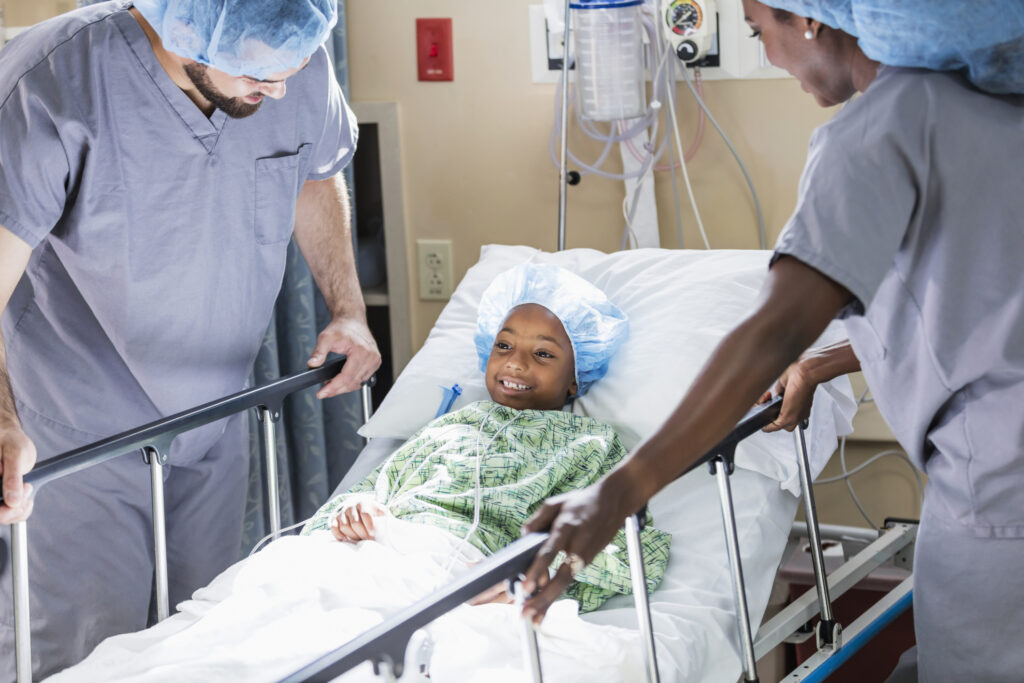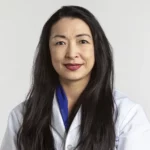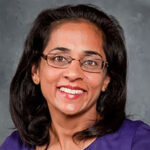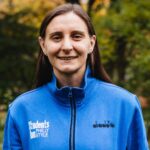SEGMENT 1: We explore the world of pediatric anesthesiology and the pressures and stresses of being an anesthesiologist with Dr. Destiny Chau, Dr. Meera Gangadharan and Dr. Meenakshi Atteri.
SEGMENT 2: It’s a trip to Philadelphia Marathon Weekend to learn more about the mentorship work of Students Run Philly Style with its Executive Director Lauren Kobylarz.
Guests:
Meera Gangadharan, MD, FAAP, FASA, Pediatric Anesthesiologist, Children’s Memorial Hermann Hospital, Houston
Destiny Chau, MD, Pediatric Anesthesiologist, and Professor, Division of Pediatric Cardiovascular Anesthesia, University of Arkansas Medical System
Meenakshi Atteri, MD, Pediatric Anesthesiologist, Arkansas Children’s Hospital
Lauren Kobylarz, Executive Director, Students Run Philly Style
Producer, Host: Carol Vassar
EPISODE 47 TRANSCRIPT
Carol Vassar, host/producer:
Welcome to Well Beyond Medicine, the Nemours Children’s Health Podcast. Each week, we’ll explore anything and everything related to the 80% of child health impacts that occur outside the doctor’s office. I’m your host, Carol Vassar, and now that you are here, let’s go. (singing)
Meera Gangadharan, Children’s Memorial Hermann:
It takes a village to be able to get a child safely to the parents’ arms and to be able to get them to go home.
Carol Vassar, host/producer:
That’s Dr. Destiny Chau, a pediatric cardiac anesthesiologist based at the Arkansas Children’s Hospital in Little Rock, summing up the purpose of her work in the operating room. It’s all about getting a child home to their family safely following surgery. We’re exploring the world of pediatric anesthesiology and the pressures and stresses of being an anesthesiologist on this episode with Dr. Chau and two pediatric general anesthesiologists, Dr. Meenakshi Atteri, also with Arkansas Children’s and Dr. Meera Gangadharan with Children’s Memorial Hermann Hospital Houston. A little later in the episode, we’ll take an audio visit to the Philadelphia Marathon to talk with a representative of a volunteer organization that pairs young runners with adult mentors to train for runs ranging from 5Ks to full marathons for health, fitness, mentorship, and community.
Right now, though, the modern history of anesthesiology dates to the mid-19th century when a dentist and a surgeon in Boston teamed up to safely perform the first surgical procedure with anesthesia. The field has come a long way in nearly two centuries, and anesthesiologists and other specialists using sedation continue to raise the bar in their practices in the name of both pain management and safety. Which is what brought Doctors Chau, Atteri, and Gangadharan to Washington DC recently to mentor their non-anesthesiology colleagues at the American Academy of Pediatrics Conference.
Here are some highlights, starting with Dr. Meera Gangadharan.
Meera Gangadharan, Children’s Memorial Hermann:
So, we presented a crash course in procedural sedation. It was presented as a clinical skills lab, and the goal was to help learners understand how to do a pre-procedural evaluation, formulate a sedation plan, and minimize risk when providing procedural sedation to children.
Carol Vassar, host/producer:
For it to be done safely, sedation must be done with skill, knowledge and an appreciation of the risk that comes with it, thus the need for continuous improvement and training for physicians using it. Dr. Chau.
Dr. Destiny Chau, Arkansas Children’s Hospital:
Proper training is very important. Sedation, however, is practiced by many different specialties, not just anesthesia. And that is why having to gain the skills from a multitude of experienced practitioners, an anesthesia would say probably [inaudible 00:03:45] most because we do that on every single day basis. Other physicians, other specialties they also are expert in sedation, however, they do in a different setting, might not do it as frequently as we do. Or might not see the range of things that we do.
So the teaching members of this part, although mainly an anesthesiologist, we also had ICU doctors and medicine doctors who do this also frequently but in a different setting. So all this to say that the capacity to teach was really rich. In that situation we can reach a wider audience because people come from different settings and come from different backgrounds and different needs in their journey to learn sedation.
Carol Vassar, host/producer:
Sedation, anesthesiology. Is there a difference? Dr. Meera Gangadharan?
Meera Gangadharan, Children’s Memorial Hermann:
So, procedural sedation there are different levels. So there’s minimal sedation, and then there’s moderate deep and then general anesthesia. So, there are different levels of how much you sedate a patient in order to complete the procedure with a child who is not anxious and who doesn’t experience pain. The goal is to get the child through the procedure without them experiencing anxiety or pain.
Carol Vassar, host/producer:
Do family members get a little anxious about having their child sedated no matter the level?
Dr. Meenakshi Atteri, Arkansas Children’s Hospital:
We all are anxious. As a parent myself, my kid needs a tonsillectomy, but to be honest, I have been avoiding it for one year just because of the anxiety and the fear that she has to undergo anesthesia. So I totally understand with other parents. So the way we deal with it is we try to answer every question and put ourselves in their shoes and try our best to make sure the questions are answered and they feel comfortable. And if there are more questions, we try to get to the bottom as much as we can.
Carol Vassar, host/producer:
What new techniques were you able to bring forth to the positions here at AAP during your skills session?
Meera Gangadharan, Children’s Memorial Hermann:
So, there are some new medications that some physicians may not have used very much. One of them is [inaudible 00:06:08]. There are also certain medications that some sub-specialists use more, such as ketamine. So, anesthesia and emergency medicine use it more, well as hospitalists may not use it as much. And then there is a reversal agent called Sugammedex, again, which is very new, and many subspecialties have not really, may have not even heard about it, definitely have not used it. And then there are newer airway techniques such as video laryngoscopes and things like that. We didn’t go too much into airway management in detail.
There is a lot more to sedation than can be taught in 90 minutes, but we hope that we were able to give them some basics about how to do it safely, and we also provided them with resources that they could reach out to learn more if they would like to. And we shared contact information so we would always be available if they had any questions in the future.
Carol Vassar, host/producer:
Dr. Chau, your specialty is not just anesthesiology but pediatric cardiac anesthesiology. Is that correct?
Dr. Destiny Chau, Arkansas Children’s Hospital:
That’s correct.
Carol Vassar, host/producer:
What’s the difference between what you do and the other two doctors who are here today, do?
Dr. Destiny Chau, Arkansas Children’s Hospital:
Well, our patient population is different. The child with a cardiac condition, they have a different spectrum of physiology. It can respond quite differently in a negative way to the same medication, the same management techniques that you would use compared to a child who does not have a cardiac condition. So armamentarium of medications of airway management and other modalities to care for them throughout the preoperative procedure is the same. Our understanding of the interactions of their pathophysiology or how their heart works compared to a normal child and a child with normal heart is more complicated. It’s a lot more complex and it requires more training and more expertise to be able to care with them safely through the anesthetic.
Carol Vassar, host/producer:
What are some of the leading-edge sedation technologies that maybe people aren’t aware of that you want to let folks know about?
Meera Gangadharan, Children’s Memorial Hermann:
Actually, I think there’s been a lot of technology, even in the non-physician sector. Like for example, in child life, MRIs now are done with those glasses that you can watch movies on. So, children watch movies and get through their MRI studies. A lot of virtual reality has been shown to decrease anxiety in the procedural or preoperative period. They’ve even used virtual reality to help children with burn dressing changes, which is quite a painful… So, it reduces the amount of pharmacological sedation you have to give if you can incorporate some virtual reality with it.
Dr. Meenakshi Atteri, Arkansas Children’s Hospital:
I heard of another device which they put it on the neck and then they can measure the neck movement, the chest movements.
Meera Gangadharan, Children’s Memorial Hermann:
But that is a great point. In terms of monitoring technologies, there’s been new things. You want to tell them about tidal carbon dioxide.
Dr. Meenakshi Atteri, Arkansas Children’s Hospital:
So one of them is entitled CO2 monitoring. So basically, when they undergo sedation, we put a nasal cannula that gives oxygen, and at the same time, it measures the CO2 that’s coming out of the nostrils, it catches that, samples it, and gives a number. So there is a range, and there’s a curve which we look for. So it gives us signs to say whether it’s deep sedation and whether the patient has stopped breathing, that it is too much sedation. So, based on that, we can titrate our doses.
Carol Vassar, host/producer:
As you can probably gather, despite its humble beginnings, anesthesiology is a deeply technical and complex medical specialty requiring vigilance, which in turn leads to enormous stress. Which begs the question, what prompted these three physicians to choose anesthesiology as their specialty, and how do they take care of themselves so that they can return to the OR day after day refreshed and ready to do their very best for the child before them? Dr. Meera Gangadharan.
Meera Gangadharan, Children’s Memorial Hermann:
I love anesthesiology, and I still do. The physiology is absolutely mind-blowing. We use almost everything we learned in medical school. We see physiology play itself out every day. It is an unbelievable privilege that parents give us their children in their most vulnerable times. They entrust us with their care. It’s itself challenging and mentally stimulating to take care of children with complex conditions and bring them through safely. The joys of working with a team. I can just go on and on and on, and you’d have to stop me, so I’ll stop myself.
Carol Vassar, host/producer:
Very effusive. Dr. Chau?
Dr. Destiny Chau, Arkansas Children’s Hospital:
So, that question, I stumbled upon anesthesiology during medical school, wanting to learn more about the airway. So I did a rotation there, and I really appreciated all the things that Dr. Gangadharan mentioned in addition to other things. So I think I got really fortunate to be able to be exposed to that and then going to the field. Because nowadays, I feel very lucky to be able to, not only enjoy doing what I love, but I get paid very well for it.
Carol Vassar, host/producer:
There you go. How about yourself? You’re new to the field.
Dr. Meenakshi Atteri, Arkansas Children’s Hospital:
Yes, a little bit new. So, when I was in medical school, we had very little exposure for anesthesia. So, after finishing my medical school in India, I applied for exams for the graduation and the MD and because it’s a different system back in India. And somebody told me at that time the life of an anesthesiologist is a good life. That’s how I chose that field, to be honest. But then, since I entered, then I realized I think it just suits my personality.
And I just like to see the result of what I do. I have the ability to give medications and see the result, now that I have to wait for a week or a month to see how the patient is responding. And I enjoy the challenge of thinking on your toes.
Carol Vassar, host/producer:
You have to make some pretty quick decisions in the operating room, don’t you?
Dr. Meenakshi Atteri, Arkansas Children’s Hospital:
Yeah.
Carol Vassar, host/producer:
How does the pressure feel? Do you enjoy it? Do you get stressed out by it?
Dr. Destiny Chau, Arkansas Children’s Hospital:
That is something that we have to be conscious about because there is a lot of adrenaline used during the day. There are times where things are just cruising up here that we’re not doing anything just because things are going well. But then truth is that we are constantly vigilant, monitoring how the patient’s breathing, how the patient is… The color, their panel respiration, monitoring their vital signs, monitoring what the surgeons are doing, and trying to integrate that in our heads. How are the next steps going to be? How the patient will react to the next movement or the next step on surgery, or the next medication.
So there’s a lot of computing going in our heads while things are proceeding looking like there’s nothing going on. So that, and when things go wrong, when I say go wrong, it means either the child stops breathing, or there is a lot of bleeding from the surgeons and the pressures dropping.
And then, as you said, there’s no time to waste. We try to prevent those things when it’s not able to prevent then, we rescue and without wasting time. So, all of that takes a tremendous amount of mental energy. And to say that, in some very complex cases, you don’t sit down. I mean, you are constantly moving, doing things for the patient, drawing medications, checking on vital signs, drawing labs to check what their blood counts are, red counts are. So, all in all, it’s because our jobs is so intense when we get home, we are super tired.
We’re mentally exhausted, physically exhausted, everything hits. So how do we do that? We have to consciously have to recognize and take care of ourselves the best we can. And I think that is a topic of constant that keeps being brought up. Not only our profession, in society in general, how in our profession, we have to be mindful of that and remind ourselves to take care of ourselves because otherwise nobody else will.
Carol Vassar, host/producer:
What does self-care look like to you? What kind of self-care do you want?
Dr. Destiny Chau, Arkansas Children’s Hospital:
Things that I love to do outside of work is walking, hiking, listening to music, podcasts. And what is hard to do is to find the time to do in the daylight. We tend to leave the house when it’s really still dark. Many times our operating room starts usually by 7:15 or 7:30, or 7:00, and sometimes the setup can take an hour to get the patients. So you’re there at 6:00 am, 6:30 am sometimes. So it’s dark and then sometimes days are long. So it’s dark, so you have to make it happen. It has to be constant thought of putting that in the front of our minds.
Carol Vassar, host/producer:
Meera, self-care for you, what does it look like?
Meera Gangadharan, Children’s Memorial Hermann:
I’m terrible at it, but I think it’s just making sure you find time to do the joyful things. So just taking care of your family, taking care of yourself, all the things we always talk about, home, family, work, family. The work should take care of us, and we should take care of the work. Yeah, just making sure do joyful things every day as much as you can and then try to eat well, sleep well, exercise, all the basic things.
Carol Vassar, host/producer:
Where do you find joy in this work? Meera?
Meera Gangadharan, Children’s Memorial Hermann:
Truly in every aspect of it. The interaction with the patient, although brief is very intense. And it is like when you asked about anxiety of the family, our job to disarm that anxiety. And so it starts from that first encounter, then going through the procedure, returning the patient safe. Because we talk about consent, really all the family’s saying is bring my child back to me safe. Right? So that whole part and definitely the medically challenging part. We are the nurse, the respiratory therapist, we are the doctor, subspecialist; we are all that in the operating room.
We are the pharmacologist as well. So we play a very unique… And I’m not exaggerating any of this; this is all true. So we are the pharmacologist, the nurse, the physician, the physician sub-specialist in the operating room. We are also the specialty that really we are the harbingers of patient safety, of the patient safety movement. Because in the 1980s, there was a lot of problems with bad outcomes from anesthesiology, maybe 1970s, with bad outcomes from anesthesia. And anesthesiologists took a very constructive approach to that. They took pains to do the research come up with process improvements so that patient safety could be improved. And after that, all the other subspecialties have followed. So, just being part of that discipline is an immensely satisfying thing, and we bring that to our work every day.
Carol Vassar, host/producer:
So all that makes it very joyful to be in this field. Dr. Chau, where do you find the joy in your work?
Dr. Destiny Chau, Arkansas Children’s Hospital:
It’s in the privilege of being part of a team that gets our kids through the most complex surgeries and to offer the parents and the child the best outcome possible. My patient group they are born with congenital heart disease, some of them very mild. So we, as a team, we’re able to get them safely through the procedure, whatever intervention they need. And then they’re cured, and they can go home to grow and be normal kids.
However, there is a large portion of them whose heart condition is very complex, and they require multiple surgeries and multiple interventions. And for me to see them grow, to see them being born and then being willed to the operating room or to the cardiac cath lab in the first few hours of life to get an intervention. And then being able to see them maybe a month later or six months later and the 12-month later and be able to follow their growth and be able to visit with the parents. And every time they come, it’s unfortunate it has to be in the hospital, but there’s a bond that gets developed.
So I treasure that so much, and I treasure the fact that there’s a trust built amongst the care team, and I am part of the care team with the surgeons, the intensivists and the nurses, the cardiologists, and then the respiratory therapists, the sonographers. It takes a village to be able to get a child safely to their parent’s arms and to be able to get them to go home. So I think it’s a great privilege and it’s something that I feel very fortunate that I found the profession that best fits me and brings me joy.
Carol Vassar, host/producer:
Dr. Destiny Chau is a pediatric cardiac anesthesiologist at Arkansas Children’s Hospital in Little Rock. She and her colleagues Dr. Meenakshi Atteri, also with Arkansas Children’s, and Dr. Meera Gangadharan, with Children’s Memorial Hermann Hospital, Houston, presented a skill set on anesthesiology at the American Academy of Pediatrics meeting in Washington DC. The AACR Philadelphia Marathon weekend is two full days focused on running.
There’s an 8K, a half-marathon, a full marathon, and the Nemours Children’s Kids run. It’s all aimed to bring world-class athletes and weekend warriors alike together for the fun of the run, no matter the length. For Lauren Kobylarz, executive director of Students Run Philly Style.
Marathon weekend is the culmination of her organization’s mentorship work, which pairs volunteer mentors with teams of students to inspire them to train for one of these long-distance runs and push themselves further than they’ve ever imagined. Nemours roving reporter Jenna Macpherson caught up with Lauren at Marathon Weekend 2023 to learn more.
Jenna Macpherson, Nemours Children’s Health:
Lauren, how many students do you have running this weekend?
Lauren Kobylarz, Executive Director, Students Run Philly Style:
This weekend, we have more than 600 middle school and high school students running across all three races. So the 8K, the half-marathon, and the full marathon.
Jenna Macpherson, Nemours Children’s Health:
Can you give me some backstory about Students Run Philly Style? How long have you been in your role? How long has the organization been around?
Lauren Kobylarz, Executive Director, Students Run Philly Style:
Students Run Philly style has been around since 2004. We’ve been part of Marathon Weekend since 2004. So we’re 19 years old this year, about to be 20. I’ve been involved in Students Run Philly Style for 14 years now. First as a volunteer, then as a member of our staff. And then, for the past year, I’ve been really honored to be our executive director.
Jenna Macpherson, Nemours Children’s Health:
And tell me what is the mission of Students Run Philly Style?
Lauren Kobylarz, Executive Director, Students Run Philly Style:
Yeah, the mission of Students Run Philly style is to transform lives through running and mentorship. So, we pair volunteer adult mentors. We have hundreds of volunteers each year that spend three days a week running after school and on weekends with about a 1,000 young people across Philadelphia each year. So the idea is that training for a long-distance race can teach you a lot about yourself and about other people and teach you how to set a goal and achieve it. And that can translate into every area of your life. So when you finish a race like this, anything is possible.
Jenna Macpherson, Nemours Children’s Health:
What got you involved as a volunteer in the first place?
Lauren Kobylarz, Executive Director, Students Run Philly Style:
That’s a great question. I moved to Philadelphia, and I was a runner. I was always an athlete and was trying to find what would my athletic passion be as an adult. And I also really enjoyed working with young people and I just started volunteering for this organization, and it gave me a space that I had never had.
I was always a really competitive athlete and we’re a non-competitive program. And so this was just this idea and community of support and helping every person achieve their goal. It wasn’t about speed, it was just about your own personal growth and journey and I just really fell in love with that idea.
Jenna Macpherson, Nemours Children’s Health:
What is the model for Students Run Philly Style? How do you grow and get involved in the community?
Lauren Kobylarz, Executive Director, Students Run Philly Style:
So, we grow very organically as a program. In 2004, we started. We had one student running the full marathon and about 20 in the half-marathon. And since then we’ve grown by word of mouth every year. So, we are a team-based program. We have about 50 different sites all over the city. So we serve every zip code in Philadelphia and we have volunteers that lead teams at each site. So, if there’s a team in your neighborhood or at your school, you can join.
We’re in grade six and above. So then you can be part of the team, and you train together. Students Run provides a training plan, free shoes, uniforms, registration for races, transportation. And so all of our sites are training at the same time for the same goal. And so weekends like this is where they all really come together and get to see that in action.
Jenna Macpherson, Nemours Children’s Health:
Do you find that kids who start the program early stay with it through high school?
Lauren Kobylarz, Executive Director, Students Run Philly Style:
Absolutely. So we have young people that start with us in sixth grade, and we have people running the marathon tomorrow who have been with us since sixth grade, and they’re seniors in high school. So you can be part of this for six years. And if you’re a young person and you do something for six years, that’s a big part of your life. And so we definitely have lots of kids that come back year after year, maybe they start by running the 8K and they move up to the half-marathon and then eventually the full marathon. And that’s something really special to see is our long time participants.
Jenna Macpherson, Nemours Children’s Health:
Do you see a lot of kids coming back as volunteers after they’ve graduated?
Lauren Kobylarz, Executive Director, Students Run Philly Style:
We do. About 10% of our volunteers are former students of ours that come back and volunteer with their team. Maybe they go on to college and come back or maybe they stay on volunteering as a college student. They’ve literally been in the shoes of our young people. And so that’s a really amazing piece of our program to see that in action.
Jenna Macpherson, Nemours Children’s Health:
In all the years that you’ve been involved in the program, is there one story that sticks out to you the most about the impact that Students Run Philly Style has had?
Lauren Kobylarz, Executive Director, Students Run Philly Style:
We have so many great stories, so hundreds of young people each year crossing the finish line. I think one thing that stands out to me is just how proud our students are of themselves when they finish the race.
And one thing that always stands out to me is when I hear a person say, I didn’t think I could do that. And then they do it. And so they get to literally see that the thing they never thought they could do that they just did, and then it just opens their mind to what can they do next? And a couple weeks ago, we hosted a qualifying run for the half and the full marathon just as a training run. And we had someone training for the half-marathon, and so he was doing a 10-mile run and I was running with him.
And I said, “How are you feeling?” And he’s just like, I didn’t think I could do this. We were at mile nine of a 10-mile run. He said, “I didn’t think I could do this.” And I said, “Today?” And he said, “No, ever.” And so just seeing that change and what can happen in just a few months, that’s what sticks with me the most.
Jenna Macpherson, Nemours Children’s Health:
As the executive director, what is your vision for the future of Students Run Philly Style?
Lauren Kobylarz, Executive Director, Students Run Philly Style:
So, Students Run Philly Style, we have so much good things ahead of us. We have the potential to be in every neighborhood in this city because all we need is people. We provide the rest of the things that you need to do this program. So, our growth is limitless here. So I’d love to see us reaching more students in more neighborhoods, and we’re also changing the face of running in a lot of different ways. We are bringing in a lot of people who are experiencing running for the first time, and I’m really excited to see them grow up into this space and continue these habits, hopefully forever.
Jenna Macpherson, Nemours Children’s Health:
What would you say to a kid who doesn’t know if running is for them and hasn’t really thought about trying it?
Lauren Kobylarz, Executive Director, Students Run Philly Style:
So most of our students, this is very new for them. About 80% of our young people have not really done a lot of other organized sports. And so if I were talking to a young person who was a little unsure about running, which I think a lot of people are, I would say, how do you know if you haven’t tried? And I would ask them to go and run a block and maybe walk a block and just take it very slow and take some steps of like, well, what are we going to do today? And breaking things down. Just like anything, breaking your training plan down into smaller steps can help you get there. And you don’t even realize what’s behind you until you look back. And so I would say, how do you know? And let’s try.
Carol Vassar, host/producer:
Lauren Kobylarz is Executive Director of Students Run Philly Style.
Music
Well beyond medicine
Carol Vassar, host/producer:
Thanks to Lauren, along with Dr. Destiny Chau, Dr. Meenakshi Atteri, and Dr. Meera Gangadharan for sharing their expertise and enthusiasm on today’s podcast…and thank you for listening. We’re headed into a brand new year, what and who would you like to hear on the Nemours Well Beyond Medicine podcast?
Our request line is open. Just go to our website nemourswellbeyond.org, and leave us a voicemail. That’s nemourswellbeyond.org, where you’ll also find every episode of Well Beyond Medicine. You can also go there to like and subscribe to the podcast. Thanks to our production team this week: Che Parker, Susan Masucci, Cheryl Munn, and Jenna Macpherson. Join us next time as we delve into the topic of culinary medicine. I’m Carol Vassar, and until then, remember, we can change children’s health for good. Well Beyond Medicine. (singing)












